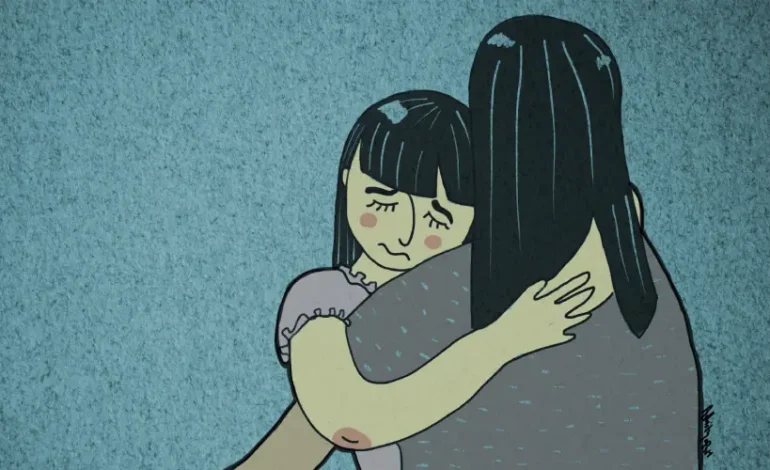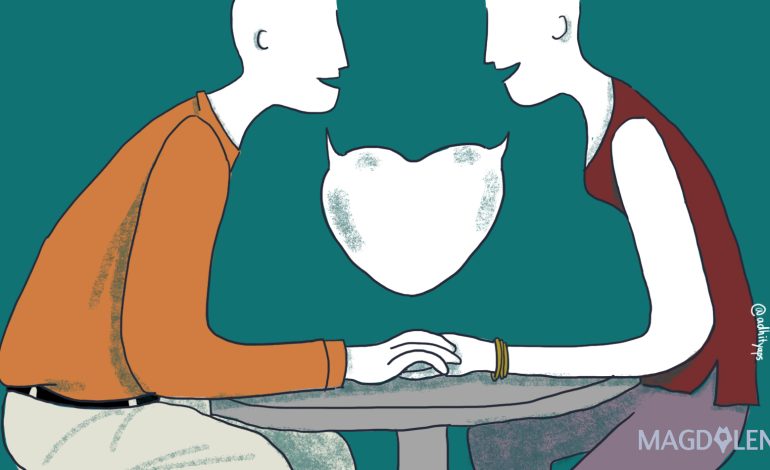
The front yard was dark and quiet. A soft light came through an opened door of a big Javanese style wooden house. I walked in and saw my father sitting on a chair. His shoulders drooped, hands in his lap, and eyes staring blankly at a muted television. We hugged in silence, his shirt wet by tears that I’d been holding during the 8-hour long travel.
“She went in peace. No need to ask for forgiveness, she already forgave you,” he said softly, stroking my head.
A week ago I was home to celebrate Eid. The house had just been repainted in brown, the same color since it was built more than 30 years ago. My mother and I had a little argument over my bedroom wall. She painted the four sides in different colors: pink, blue, green, and purple. I thought it was childish; she insisted it was refreshing. She didn’t cook special dishes for Eid, but prepared come cookies and fruits for visiting relatives and neighbors. The sofa and chairs were lined up in two columns with a line of tables in between.
The night when I went home the following week, the chairs, sofa, and tables had been taken out. Carpets were arranged for people who attended her funeral in the morning. That night, my sister in law put out a large mattress for us all. It was placed right in front of the television, at the center of our family room. My little niece lay in the middle, between her parents, my father and myself. We returned the mattress to my brother’s bedroom in the morning, and took it out again at night for seven days. It was odd but felt just right.
Despite her rants about flawed plots, black and white characters, or poor acting in drama series, my mother couldn’t stop watching them. She had long comments about the story but cried over scenes. Sometimes I teased her when she cried. She just smiled and ignored me. For a long time I didn’t notice that she only cried during specific or at specific stories. It was always a story or a scene of children being separated from their parents.
“Such scenes always bring back the painful memories when I was a little girl. Time when I yearned for my father in my life,” she told me one day.
The divorce was too painful for my grandmother that she denied my mother’s access to her father. My mother was finally able to make her first contact with her father when she was in high school. Sneaking out from school, she received help from a distance relative to see him. Both of her parents remarried again, but they never got over their anger and hatred. I was no older than five when my mother took me to visit her dying father. Knowing it was the last chance, she went to visit her mother, kneeled before her, and asked her to forgive him. It was fruitless. So the little girl that was my mother mourned and missed her father again.
An invisible iron ball floated in my throat. It melted and run to the back of my head, my mouth, my nose, and my eyes. The scorching liquid blocked my nose and burnt my eyes. Seconds before it broke into tears, I excused myself and walked hastily to the restroom. I hated it when it happened during meetings.
I took deep breaths, counted four for breaths in, two for hold, and four slow breaths out.
“Let it rain, let it come, let it go,” I repeated my mantra.
Keep breathing. That’s all you have to do, that’s what separates the living from the dead, I told myself.
It’s ironic that we dwell on education, career, marriage, savings and investment, retirement, and other so-called proper life planning, but are never prepared for the most important thing: losing our beloved. How to carry on living when it feels like we’re walking on quicksand.
When I was little, I often imagined splitting myself into two or having my soul leave my body. We would have fun playing dolls or making pony tails for each other. Before bed time, I imagined what would happen when I die. It would be dark underground. Pitch black. Very quiet and still. I felt like floating in an infinite darkness and nothingness state. I never revisited those moments until my mother passed away. Her death seemed to have awakened the long buried memory. Shortly after her death, I gave away my fiction collection and replaced them with non-fiction books, which were mostly about death, soul, and afterlife.
“Aunty, do you know where Uti is?” my then 4 years old niece asked me of her grandmother one morning.
“Where do you think she is?” I asked her back.
“I know! There beneath the soil. I saw her sleeping for good,” she spoke as if to remind me that I missed her funeral.
But it wasn’t the only thing I missed. I missed the last time that I could’ve spent with her. I should’ve held our last five-minute call longer. I wish I had taken selfish decision, cancelled my business trip, and let my team or my boss make it up for our client. I wish I had a chance to talk as two adults about her childhood, how she loved her parents, and her passion for social works. For once, perhaps, I could’ve listened to the little girl in her. The regret was even powerful when I realized that I had loved her more than I thought.
I used to go to the cinema three times a week, watching movies and series in marathon. There were the horror week – from Rosemary’s Baby, Friday the 13th to The Omen – the festival movies week, old movies week such as Ben Hur and Gone with the Wind. After her death, I couldn’t enjoy them anymore. There was nothing more entertaining for me than watching hours of programs on penguins, sea gulls, and dolphins. I was mesmerized by dolphin’s mating dance, but felt really sick of romantic comedies, or deadly bored with science fiction.
Friends and co-workers started noticing that I became skinnier. I deliberately never skipped lunch with co-workers, so they didn’t know that it was the only meal I had in a day. I had lost my appetite for foods. The only thing I longed for was to know how to reset my feeling, reprogram my mind – whatever it took to wire off and rewire my brain cells. I was scared that I would never get out of the darkness, in constant anticipation of sudden burning-eyes moment.
It’s ironic that we dwell on education, career, marriage, savings and investment, retirement, and other so-called proper life planning, but are never prepared for the most important thing: losing our beloved. How to carry on living when it feels like we’re walking on quicksand. I guess no one is ever prepared for it.
“I had a dream last night. We went for a picnic with mom who was in her 30s. She wore a knee-length dress that match her beehive hairdo and wedges shoes,” I told my father over the phone.
He said that she often visited his dreams in her thirty something version too.
“Well, it is lovely to see her in that dress – better than in long dress and head scarf,” I said. We both laughed.
I kept some of her belongings as mementoes. My favorite is the blue kebaya blouse she wore on her engagement day to my father. I put it on, but couldn’t button up the bust part. I thought how slender she was and how much weight she gained over the years. Running through my hands over the heavy brocade, I couldn’t help wondering if she had fun raising my brother and me.
“Oh, she did. But there were many times that she cried helplessly when she couldn’t handle you two being mischievous,” my father said over the phone the other morning.
“So this is how it feels losing half of my soul,” he called me one morning in a cracked voice. I didn’t know how to respond. The call ended in an awkward silent.
The morning calls were therapy session for us. We were a therapist to each other. Most of the time I listened to him. He told me about his trouble sleeping, days that he forgot and waited until 9 p.m. for her to come home, or when he wished she was still with us. He wished he had refused the doctor’s advice of transferring her to ICU, so he had more time with her. He shared that they talked about me and their granddaughter during her five days in the hospital. She felt sorry about her step sister and my father’s sister who attended her in hospital.
“Sorry for causing you so much trouble,” she said to them.
Listening to those stories made me feel closer to her.
“Your bedroom is cleaned. I’ve changed the bulb too,” my father told me while we were having iftar. This year is the fifth Ramadan without her.
“Hmm… I will sleep in front of the TV, as usual,” I replied promptly.
“Okay. You better take the small mattress. It’s lighter for you to carry.” he said. I said nothing.
I took out and made up the large mattress that we used that night. The same mattress at the exact same spot. It just felt right that way.
The burning feeling in my nose and eyes still comes occasionally during meetings, trips, movies, or when I’m alone. When it’s unbearable, I’d excuse myself to leave the room. Counting my breaths, four breaths in, feeling the air going through my nostrils, my brain, my spine, and filling my stomach; two to hold; and four slow breaths out. I no longer hate it when this moment comes. I have gotten used to it. Be friend with it. For me, the pain of losing my mother is a remarkable way the universe teaches me about the beauty of love.






















